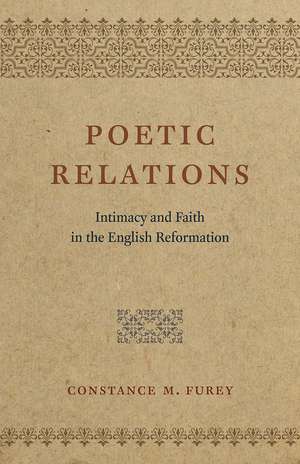Poetic Relations: Intimacy and Faith in the English Reformation
Autor Constance M. Fureyen Limba Engleză Hardback – 3 aug 2017
What is the relationship between our isolated and our social selves, between aloneness and interconnection? Constance M. Furey probes this question through a suggestive literary tradition: early Protestant poems in which a single speaker describes a solitary search for God.
As Furey demonstrates, John Donne, George Herbert, Anne Bradstreet, and others describe inner lives that are surprisingly crowded, teeming with human as well as divine companions. The same early modern writers who bequeathed to us the modern distinction between self and society reveal here a different way of thinking about selfhood altogether. For them, she argues, the self is neither alone nor universally connected, but is forever interactive and dynamically constituted by specific relationships. By means of an analysis equally attentive to theological ideas, social conventions, and poetic form, Furey reveals how poets who understand introspection as a relational act, and poetry itself as a form ideally suited to crafting a relational self, offer us new ways of thinking about selfhood today—and a resource for reimagining both secular and religious ways of being in the world.
As Furey demonstrates, John Donne, George Herbert, Anne Bradstreet, and others describe inner lives that are surprisingly crowded, teeming with human as well as divine companions. The same early modern writers who bequeathed to us the modern distinction between self and society reveal here a different way of thinking about selfhood altogether. For them, she argues, the self is neither alone nor universally connected, but is forever interactive and dynamically constituted by specific relationships. By means of an analysis equally attentive to theological ideas, social conventions, and poetic form, Furey reveals how poets who understand introspection as a relational act, and poetry itself as a form ideally suited to crafting a relational self, offer us new ways of thinking about selfhood today—and a resource for reimagining both secular and religious ways of being in the world.
Preț: 223.28 lei
Preț vechi: 325.07 lei
-31% Nou
Puncte Express: 335
Preț estimativ în valută:
42.72€ • 44.73$ • 35.35£
42.72€ • 44.73$ • 35.35£
Carte indisponibilă temporar
Doresc să fiu notificat când acest titlu va fi disponibil:
Se trimite...
Preluare comenzi: 021 569.72.76
Specificații
ISBN-13: 9780226434155
ISBN-10: 022643415X
Pagini: 224
Dimensiuni: 140 x 216 x 30 mm
Greutate: 0.41 kg
Ediția:1
Editura: University of Chicago Press
Colecția University of Chicago Press
ISBN-10: 022643415X
Pagini: 224
Dimensiuni: 140 x 216 x 30 mm
Greutate: 0.41 kg
Ediția:1
Editura: University of Chicago Press
Colecția University of Chicago Press
Notă biografică
Constance M. Furey is associate professor of religious studies at Indiana University. She is the author of Erasmus, Contarini, and the Religious Republic of Letters.
Cuprins
Acknowledgments
On Poetry
On Poetry
Introduction
1 Authorship
2 Friendship
3 Love
4 Marriage
Coda
Notes References Index
Recenzii
“Furey has written an important book…the use of a wide range of writers who are seldom discussed together helps to strengthen Furey's argument that the trend in early modern England and in the American colonies was not to use poetry merely as a means of introspection; rather the poems reflect attempts to build relationships and community with the audience, be that audience lover, patron, or God. Furey's historicized close readings of the poems are illuminating and compelling. This wonderful book deserves to be read and discussed, and it should prove influential in the years to come...Essential.”
"Constance M. Furey’s Poetic Relations: Intimacy and Faith in the English Reformation brings the author’s expertise as a religious studies scholar and wide-ranging familiarity with literary scholarship in early modern religious poetry. . .guided by the astute perception that ‘form is the medium of relationality,’ [it] may attract interest for its conceptual rigor."
“Poetic Relations benefits from Furey’s wide learning in the fields of literary and religious studies. Using a variety of human relationships—from friendship to love to marriage—as models, Furey investigates the nature of the ties between the speaking I of the lyric poem and the reader. She argues that poems should be understood as essentially relational encounters rather than private utterances. This ‘relational poetics’ encourages an important ethical reimagining of poetry and of selfhood, proposing that we understand both lyric texts and people as fundamentally dependent on connection.”
“In this compelling and deftly argued book, Furey dismantles binary assumptions about selfhood that remain prevalent in gender studies and religious studies. Contending that early modern Puritan poets should not be dismissed as grimly solitary or solipsistic individuals, she demonstrates how these poets stand as crucial resources for grasping the relational and poetic constitution of selfhood.”
“This beautifully written and incisive study insists that no single model of relationality is definitive of the era; on the contrary, it is the richness of the ways in which relationality is enacted within the poetry of Donne, Lanyer, Herbert, and others that propels Furey’s timely book and makes it so exciting to read.”
"Furey is a sensitive reader of poetry and a graceful, accessible writer; she is both confident and generous in situating her readings amid other critics'."
